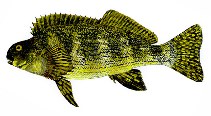| Family: |
Aplodactylidae (Marblefishes) |
| Max. size: |
45 cm SL (male/unsexed) |
| Environment: |
demersal; marine; depth range 0 - 10 m |
| Distribution: |
Southwest Pacific: southeastern Australia only. |
| Diagnosis: |
Dorsal spines (total): 17-17; Dorsal soft rays (total): 18-20; Anal spines: 3-3; Anal soft rays: 6-7; Vertebrae: 35-35. Adults have a short-based anal fin, pectoral fins with thickened lower rays, and are grey to blue-black with lighter mottling on the sides and light spots on the fins (Ref. 33616). It is distinguished from its congeners in having larger body scales (lateral-line scales 72± 82 vs. 83± 120) and absence of vomerine teeth (Ref. 86913). |
| Biology: |
Found on shallow exposed rocky shores, aggregating in high-energy zone, just below foaming surface to depths of about 10 m (Ref. 9002); in kelp and weed areas (Ref. 86913). Feed on either loose or attached weeds and algae (Ref. 9002); mainly consisting of Corallina pilulifera,
together with smaller quantities of Ulva actuca, Jania and filamentous species such
as Sphacelaria sp. (Ref. 86913). |
| IUCN Red List Status: |
Not Evaluated (N.E.) Ref. (130435)
|
| Threat to humans: |
harmless |
Source and more info: www.fishbase.org. For personal, classroom, and other internal use only. Not for publication.
